 Home > CR Interviews
Home > CR Interviews CR Sunday Interview: Joe Casey
posted February 16, 2014
CR Sunday Interview: Joe Casey
posted February 16, 2014

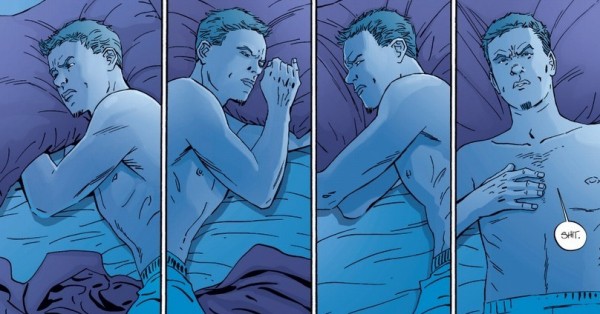
*****
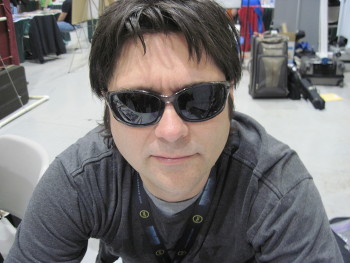
I've known the writer
Joe Casey for a little over ten years now, which means I've known him for the majority of a career that already seemed old when we talked in a stale, pre-media hub backroom at Meltdown Comics for a
Comics Journal interview. I've interviewed him every two or three years since. What I admire about Casey's relationship to comics right now is that despite
concurrent opportunities and responsibilities in other media he has sustained a full-on press doing a variety of creator-driven projects.
The Bounce and
Sex are at the heart of his current output; he's also responsible for
a series using the Dark Horse-owned superhero comics from a generation ago. Since we began talking over an excruciating several month period completely my fault because of a desire to use what follows in a slightly different way than usual -- I've since backtracked, so you get it here in its full glory -- Casey has completed one giant
Jack Kirby-related project (
GØDLAND, which worked with much of the same language of "cosmic comics" the King of Comics used at times) and begun another (writing with a number of talented artists
on the latest Captain Victory project; a concept owned by Kirby).
I appreciate Joe's time, patience, work, and, ultimately, his candor. -- Tom Spurgeon
*****
TOM SPURGEON: Joe, I'm sort of fascinated by the fact that we have so many productive writers that have been around comics for years and years now. You have a lot more on your plate now than when we first talked a decade ago. Do you write differently now? How is the actual act of writing, how you make the time, how you use that time, different than when you started?
JOE CASEY: Y'know, it's a little tough to get any real perspective on how I manage my time these days. Maybe that's
because there's a lot on my plate at any given moment. Sometimes I think I'm Mister Time Management, really on top of all my shit. Other times, I'm really behind the eight ball, just scrambling to keep up with everything. But that push and pull... it's the nature of the beast, no doubt about it. This is the life I chose, so I'm sure as hell not gonna bitch about it too much. In fact, I feel like right now I'm more committed than ever to actually making comic books. I
hope that's the case, anyway. All the animation and television and feature work flying around always threatens to be a distraction, as much as they're opportunities, too. On top of that, it's not like I'm phoning in superhero scripts to
Marvel or
DC on the side... my comic book work consists primarily of creator-owned series that take a lot of attention and a lot of focus to keep them going at a certain standard of quality. I don't know if I write any differently now, but I
do know it definitely takes more effort to set aside time to write comic books in the specific manner I like to do it. But so far, so good.


SPURGEON: Do you feel a kinship to the writer you used to be? Are there things that you used to write about that are less interesting to you now? What about things that you never thought you'd engage that you're engaging? It seems to me there's a thematic continuity, but that you may approach things in a more focused manner project to project.
 CASEY:
CASEY: On the rare instance when I
do cast a backwards glance, it's pretty obvious to me that the writer I used to be was incredibly naive. Probably in a good way, but naive nonetheless. But, then again -- to indulge in a painful cliché -- the world was very different then.
My career path happened to coincide with two evolving circumstances that, over a space of ten years or so, completely had an effect on me and my work that I never could've anticipated. And, I might add, neither one really exists anymore. The first was already occurring when I broke in... the "writer-driven" era of mainstream comics. I've said this before, but it was something that I was able to take full advantage of, I definitely used it to further my career and position myself in the industry and all that crap. So, y'know, yay for me. But I never could've predicted that I'd have that kind of lucky timing.
The second thing was the...
legitimizing of comic book creators within other areas of entertainment. Or, more specifically, "Hollywood" (to use that nebulously goofy term). As anyone who was around back then probably remembers, in the mid-90's, comic book creators were not taken too seriously as creative entities outside of comics. There were exceptions... but those exceptions had tended to leave comic books behind altogether to assimilate more fully into the machinery of Hollywood. And, more often than not, those guys simply became cogs in that machine, not the powerhouses they were considered to be in comics fandom. And in other cases, creators eventually came running
back to comics where they realized they had it pretty good (in terms of basic creative freedoms and productivity, if not in terms of money). So just as things started to genuinely turn in our favor, there I was, ready to take advantage, just like a lot of creators of my generation. It's allowed things like
Ben 10 or
Generator Rex or the
X-Men: Legends videogame or
Man Of Action's feature slate or our executive producer/showrunner gigs to happen in a much healthier environment ("healthier" being a relative term, of course).
And, as I said, both of those circumstances have pretty much come and gone at this point. Mainstream comics are completely and totally editorially-driven now, maybe to a fault. But, then again, who am I to say that? They're certainly adept at making money, which is probably their primary function these days. So, hey, good for them. And the Hollywood thing... well, the novelty of it has worn off. We've got more power and respectability in the Hollywood arena, but we're also a dime a dozen (which, ironically, ends up
limiting that power). Let's put it this way: Frank Miller co-directed a big hit, based on his own comic book property... then he directed a big, fat bomb, based on one of the masters of the medium's most famous strip. That sentence alone would've been almost inconceivable 15 years ago, outside of our geek dreams. Now we can speak it out loud and no one even blinks in mild disbelief.
To get back to the meat of your question, how it affects my
work -- how I'm approaching it now -- is something that's tougher to identify. Especially from
my perspective. Believe it or not, I think the avalanche of work I currently deal with has resulted in my comic book work being less...
posed. Is that the word for it? It's much less self-conscious. It's more personal. Even the genre stuff. Hell,
especially the genre stuff. So I guess I let my personal issues hang out there a bit more. Conversely, I think maybe I've gotten more refined at my craft, so those issues are less identifiable in the actual text. Or subtext, as the case may be. But, to me, I'm putting a lot more out there for the world to see. For me,
that's the "thematic continuity" that I can identify. Feel free to disagree with that...
SPURGEON: I think that's a fair assessment, Joe, but I'm interested in both the how and the why of that general theory. Can you point to something that expressed itself in one of your comics from the last five years -- or if you don't want to pull back the curtain, a plot point or a narrative sequence in your comic -- that would have been out of bounds in 1998. And also: why do you think you're a different writer then you were 15 years ago? Because I know you know enough about comics history to know that not everyone changes. Was it a matter of developing a skill set that allowed you to say certain things? Is it about realizing you can say certain things through your work that you never thought about exploring there?
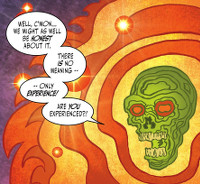 CASEY:
CASEY: I think, more than anything, I started to relax a little bit and just tried to think of cool shit to do in comic books. But, in doing that, even
more of my personality started to bubble up in the work. It hasn't been a conscious thing at all, but it's definitely happened and when I look at the last few years, I can see it pretty clearly. I think something as over-the-top as
Butcher Baker actually contains some of my most subtle character work, in terms of how it relates back to me and my own life. I think the
GØDLAND finale expresses a very emotional worldview, even amidst all the cosmic spectacle and purple prose. I'm talking about some really "uncool" ideas in there, but they're incredibly important to me, personally. And the entire conceit of
The Bounce has a lot to do with what's happening in my life right now, and what's been happening the past couple of years, but you'd probably have to know me really well to see past the
nouveau superhero story that exists on its surface and understand what I'm
really talking about. So I don't shy away from working through some of my personal shit through my work, but luckily I think my chops are developed enough now that I'm never shoving it in anybody's face. It's never blatant to the point of being distracting.
So I'm even more committed to the concept of personal expression through artistic endeavor. I mean, I always have been, to a certain extent... but as a younger writer, I wasn't good enough to pull it off in any meaningful way. I had raw energy, but no real finesse. To do this work well, I think you need both in equal measure. I've got a little more mileage now, been knocked down a few times, I've seen more shit go down around me. You can have any number of responses to the passage of time... it can make you cynical, it can wear you down to a nub, it can infect you with all sorts of negativity if you think the world is somehow passing you by. But for me, I just get more charged up to keep creating, to keep pushing myself, to try and discover new places to take this art form. I'm still a big process junkie, but I suppose I'm more interested in harnessing process knowledge to achieve some sort of deeper self-discovery through the work itself, both in the doing of it and in the finished product.
I'm sure that comes across like a lot of bullshit, New Age-y rhetoric, talking about it in an interview like this. But it's not talked about enough in this industry, on the "mainstream" side especially. High concept is all well and good, and I appreciate it, but that's certainly not all there is to being a creative artist. Y'know, "making it" or being successful is just a small component in the overall scheme of things. I'm trying to know myself better, and a lot of that can happen through the work that I do, the things I create. 


SPURGEON: You enjoyed a lot of success early on and you're one of the guys that has enjoyed enough success that you're a model for how some folks would like their careers to progress... is that a difficult transition, from this kind of watching people and seeking out models to having people look at you that way?
CASEY: I think "success" is all about how you look at it, how you choose to define it for yourself. Just getting into this business on
any level was the only kind of success I ever dreamed about, ever since I was a kid. I just wanted to be in the mix somehow. So, what's happened since has been pretty mind-blowing. But I also I think I had some lucky breaks early on and I know I worked my ass off to take full advantage of every opportunity that was presented to me. That's how I look at it now. Besides, I really don't think I'm much of a career role model, either. Nor should I be. I started out just wanting
a career... I ended up having
my career. And no one else is going to have my career. 


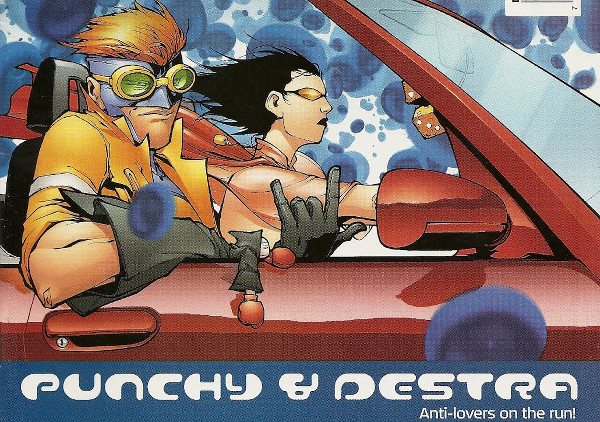 SPURGEON: For that matter, you have a body of work now, you're a known creative quantity. Is it odd -- is it even aggravating -- to encounter your own work in re-purposed form? I see bits and pieces of what you did in The Intimates, what you've done with Iron Man, what you did with WildCATS popping here and there... do you consider just part of the creative cycle, or do younger writers process their influences differently now?
SPURGEON: For that matter, you have a body of work now, you're a known creative quantity. Is it odd -- is it even aggravating -- to encounter your own work in re-purposed form? I see bits and pieces of what you did in The Intimates, what you've done with Iron Man, what you did with WildCATS popping here and there... do you consider just part of the creative cycle, or do younger writers process their influences differently now?
CASEY: Oh,
that. [Spurgeon laughs] Well...
que sera, sera, right? I think, at first, it was weird to see little things I'd done, techniques I'd tried, concepts I'd explored, show up in other comic books, especially in certain instances when it was just so goddamn
obvious. And even certain things, approaches, ideas, opinions on craft that were, at best, tolerated and, at worst,
vilified when I would do them. Then again, those instances are still so few and far between... especially when you consider how much has been lifted from guys like Frank Miller, Warren Ellis, Garth Ennis and Grant Morrison over the years. Warren and Garth, in particular, don't get nearly the amount of credit they deserve for contributing to the comic book writer's toolbox as much as they did.
But that's a good part of what writing is... you read something, see something, hear something, whatever it is... you're inspired by it, you want to test drive it for yourself or you simply assimilate it and it shows up in your own work. Those creators I name-checked... they're obviously influenced by other sources, too. There are countless things that I've lifted from other, better writers than me over the years. So many great writers have inspired me in so many ways, I guess I do look at it as just part of the ongoing creative chain, and we're all just links in that big chain. And I'm still on the lookout for new things to (hopefully) influence me, inside and outside of comics. I'll admit, it gets tougher to be as much of a student as I used to be, the deeper into my career that I get, but I'm still out there trying...



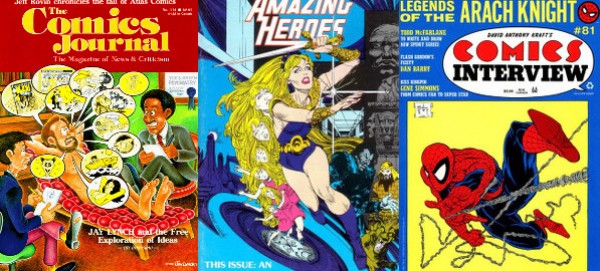 SPURGEON: You noted the passing of editor/translator Kim Thompson, and talked about how important his stint at Amazing Heroes was in processing a view of the industry that corresponded to the work you were seeing. Do you still do that? Do you still pay attention to the milieu in which comics are created? Do you see major differences between the industry you entered and the one in which you're working now?
SPURGEON: You noted the passing of editor/translator Kim Thompson, and talked about how important his stint at Amazing Heroes was in processing a view of the industry that corresponded to the work you were seeing. Do you still do that? Do you still pay attention to the milieu in which comics are created? Do you see major differences between the industry you entered and the one in which you're working now?
CASEY: I suppose I pay as much attention as my job demands. Or as much as I feel like at any given moment. Take your pick. But, admittedly, I'm not the comic book
reader that I used to be, and I'm certainly not hip-deep in those larger, behind-the-curtain conversations like I had been previously. I hear my share of gossip, just like everyone else does.
But, y'know, I'm just not all that interested in who's next up at bat writing or drawing
Firestorm or whatever big event the WFH publishers are planning and what they have to say about it. And even though the readership -- for mainstream comics, at least -- skews a lot older than it did when I was a teenager reading
Amazing Heroes and
TCJ and
Comics Interview, most things still seem to be marketed as though the audience exists at that level, which is weird enough. And add to that, we're living in an
Access Hollywood/TMZ-era of entertainment journalism, which was bound to spread to our "milieu", too. So from my vantage point, there's so much bullshit flying around... no one's
informed enough to be able to tell real truth to power, if anyone's even
interested in that kind of thing anymore (and I'm not sure
I am, either). That didn't really exist 20 years ago when I was on the other side of the gig, trying to understand all the moving parts of the overall machine. And, of course, there were a few less moving parts back then, too.
I do think it's ironic that, the bigger the comic book industry gets, in terms of perceptio


